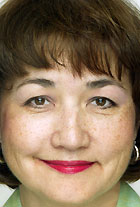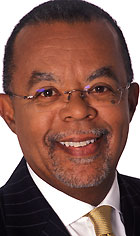Washington University in St. Louis awarded honorary degrees to five prominent people, including a 2004 Nobel Prize winner in chemistry and a pioneering scholar of African and African-American literature, during the university’s 145th Commencement ceremony May 19.
During the ceremony, which began at 8:30 a.m. in Brookings Quadrangle, the university also bestowed academic degrees on more than 2,500 students.
The honorary degree recipients and their degrees are:
• Aaron J. Ciechanover, M.D., D.Sc., a 2004 Nobel Prize winner in chemistry and Distinguished Research Professor at Technion-Israel Institute of Technology in Haifa, doctor of science;
• Anna Crosslin, president and chief executive officer of St. Louis’ International Institute, doctor of humanities;
• Steve Fossett, record-setting adventurer and the first person to fly around the world alone, nonstop, in a balloon, doctor of science;
• Henry Louis Gates Jr., Ph.D., the W.E.B. Du Bois Professor of the Humanities and chair of the Department of African and African American Studies at Harvard University, doctor of humane letters; and
• John F. McDonnell, vice chairman of Washington University’s board of trustees and retired chairman of the board of McDonnell Douglas Corp., doctor of science.

Ciechanover has devoted a highly productive scientific career to understanding the mechanisms of protein breakdown within living cells — a vital aspect of cellular metabolism.
His early scientific work on cellular proteolysis (protein breakdown) was conducted at The Technion as a graduate student (D.Sc.) of Avram Hershko, M.D., Ph.D. Together they made the initial discovery of the ubiquitin-dependent proteolytic system, its enzymatic components and mechanisms of action.
The basic functions of ubiquitin and the components of the ubiquitinylation pathway were elucidated in the late 1970s and early 1980s in groundbreaking work performed by Ciechanover, Hershko and Irwin A. Rose, Ph.D., for which the Nobel Prize in chemistry was awarded in 2004.
The ubiquitin system rigorously maintains the quality of proteins in cells by eliminating faulty and unneeded proteins. Equally important, it controls numerous basic cellular processes by removing key regulatory proteins.
Discovery of the ubiquitin pathway has led to the understanding of how the cell controls the cell cycle, DNA repair, gene transcription and some immune defense functions. Defects in the pathway have been implicated in the pathogenesis of many diseases, certain malignancies and neurodegenerative disorders among them.
As a result, a potent anti-cancer drug has already been developed, and drugs for other malignancies and diseases are likely on the way.
In addition to the Nobel Prize, Ciechanover received the 2000 Albert Lasker Award for Basic Medical Research with Hershko and Alexander J. Varshavsky, Ph.D., for their work on the ubiquitin system.

Crosslin, a 1972 Arts & Sciences graduate of Washington University with a bachelor’s degree in political science and a minor in Asian studies, has helped thousands of refugees and immigrants make a smooth transition to life in the St. Louis area.
Under Crosslin’s entrepreneurial leadership, the International Institute, which is in St. Louis’ South Grand neighborhood, has grown in size and scope. Today it is the largest resettlement agency in the state and it annually provides educational, counseling and employment services to more than 8,000 newcomers from 55 countries.
Founded in 1919, the institute is nationally recognized for its programs designed to move refugees and immigrants quickly from overwhelming dependence to productivity and self-sufficiency
During Crosslin’s 28-year tenure, the institute has led the charge to resettle refugees, resulting in the largest Bosnian community in the United States now claiming St. Louis as home.
The organization is playing a major role in revitalizing its surrounding city neighborhoods, where many immigrants are finding jobs, starting businesses and buying homes.
Recently, Crosslin launched the International Institute Business Solutions Center, a social enterprise that provides language and cultural expertise to local businesses to help them work more effectively in the global marketplace and with more ethnically diverse workforces. She is working to expand the program to more than 20 other metropolitan areas during this year.
In recognition of her leadership role among fellow International Institute directors nationwide, Crosslin was elected chair of the Standing Committee of the Professional Council of the U.S. Committee for Refugees and Immigrants, the umbrella organization for the country’s International Institutes. She served from 2004-06, retiring from the position in February.

Fossett is one of the world’s most accomplished adventurers. Whether sailing around the world, swimming the English Channel or flying high-altitude gliders, he always rises to the challenge.
The holder of current official world records in five sports, he became the first person to complete a solo round-the-world balloon flight after working toward the record for seven years. The flight, his sixth attempt at the record, launched from Northam in Western Australia, on June 19, 2002, and returned to Queensland, Australia, on July 4, 2002.
During his historic circumnavigation of the world, Fossett traveled 20,602 miles, reached speeds of up to 204 miles per hour, and flew as high as 34,700 feet. Washington University served as mission control for this flight as well as three other of his balloon flights, including his 1998 launch from the old Busch Stadium.
Fossett’s spirit of adventure also is apparent in his business enterprises. He founded and managed Lakota Trading Inc., a major exchange floor market-making firm. He was a member of the New York Stock Exchange for 26 years.
Born in Jackson, Tenn., in 1944, Fossett earned a bachelor’s degree in economics from Stanford University in 1966 and a master’s degree in business administration from Washington University in 1968. He received the John M. Olin School of Business Distinguished Alumni Award in 1995.
A member of the university’s board of trustees since 1995, he also serves on the National Executive Board of the Boy Scouts of America and is a member of the World Scout Committee.

A pioneering scholar of African and African-American literature, Gates is considered one of the nation’s foremost cultural critics and a pre-eminent public intellectual.
Gates, who is also director of Harvard’s W.E.B. Du Bois Institute for African and African American Research, graduated summa cum laude from Yale University in 1973. He won a Mellon Fellowship to study at Clare College at the University of Cambridge in England, where in 1979 he became the first African-American to earn a doctorate.
In 1980, as an assistant professor at Yale, he launched the Black Periodical Literature Project, devoted to studying black newspapers published in America between 1827 and 1940. The following year he received a $150,000 MacArthur Fellowship — or “genius grant” — which culminated in his re-discovery and re-publication, in 1983, of Harriet E. Wilson’s “Our Nig; or, Sketches from the Life of a Free Black” (1859), the first novel published in the United States by a black person.
Over the next several years Gates helped to define an African-American literary canon through a series of books, notably “The Signifying Monkey: A Theory of Afro-American Literary Criticism” (1988), winner of the American Book Award.
Gates has written widely on the contemporary African-American experience, in books such as “Colored People: A Memoir” (1994) and “The Future of the Race” (with Cornel West, 1996), as well as in “Thirteen Ways of Looking at a Black Man” (1997), a collection of magazine profiles.
In 1997 Gates was voted one of Time magazine’s “25 Most Influential Americans.” Other projects include developing and hosting a series of documentaries for PBS, most recently “African American Lives” (2006).

McDonnell was destined for a career in aerospace. Born in Baltimore in 1938, he is the son of McDonnell Aircraft founder James S. McDonnell. He holds a bachelor’s (1960) and a master’s (1962) degree in aeronautical engineering, both from Princeton University.
Also an alumnus of the John M. Olin School of Business, McDonnell had a distinguished career of more than 35 years with McDonnell Aircraft and McDonnell Douglas Corp., starting in engineering and retiring in 1997 as chairman of the board.
He led the company successfully through the early 1990s when the U.S. defense budget and the aerospace markets were shrinking dramatically. In the face of a rapidly consolidating aerospace industry, he oversaw the 1997 merger of McDonnell Douglas with Boeing to create the world’s largest aerospace company.
While McDonnell has left his mark on the aerospace world, he has also made significant contributions to Washington University.
Now a Life Trustee, McDonnell was first elected a Washington University trustee in 1976. After holding various board leadership positions, he was elected chairman of the board in 1999. In 2004, he was elected to his current position as vice chairman and he now chairs the board’s Development Committee.
McDonnell also served as chairman of the leadership phase of the Campaign for Washington University. When the campaign was publicly announced in September 1998, $541 million already had been received or committed. The campaign ended June 30, 2004, with $1.55 billion in gifts and commitments, well beyond the stated goals.
A founding member in 1997 of Washington University’s International Advisory Council for Asia, he is also an Advisory Committee member for the newly formed McDonnell International Scholars Academy. He, along with the JSM Charitable Trust, provided the naming gift for this global education and research initiative partnering Washington University with top foreign universities and leading multinational corporations.